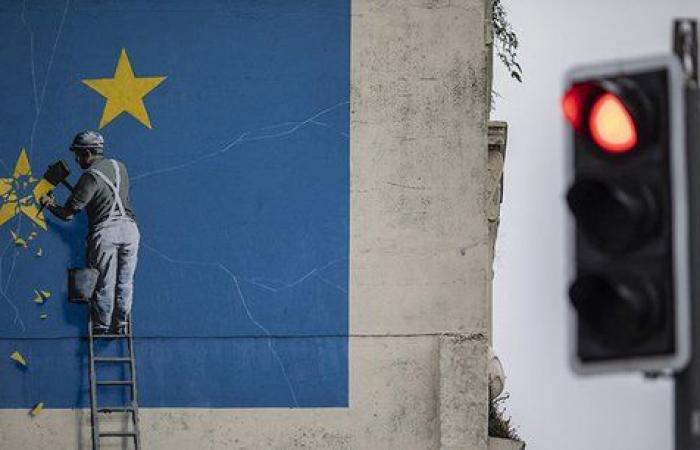For the past two weeks the National Rally postponed its most expensive promises. But its nationalist and populist program leads to a departure from the republican path taken by the country since the Revolution. Explanations.
Legislative: Europe, largely absent from the RN’s economic program
The denial of five hundred years of French history
Unsurprisingly, Jordan Bardella has made immigration a priority issue, indicating that he will act in this area as early as the summer if he reaches Matignon. To reduce entries into the territory to a minimum, restrict the rights of foreigners and curb diversity – the heart of its project since its creation – the RN has reiterated its proposals: removal of legal guarantees on expulsions, tightening of family reunification, suspension of the regularization of undocumented workers by prefects (Valls circular), establishment of an offense of illegal residence, reform of state medical aid, ban on so-called “segregated” jobs. “strategic” (without precision) to binationals… At the same time, the slip-ups on social networks of several dozen candidates or substitutes invested under the RN label have recalled in the public debate the nature of the party founded by Jean-Marie Le Pen .
The RN knows that many measures will certainly be invalidated by the Constitutional Council. Because they would deviate from fundamental texts and international treaties, in particular those that protect families (a parent is not separated from their children) and human dignity (any human being who is sick or in danger of dying is helped, for example). In April, the wise men rejected a LR project (identical to that of the RN) aimed at prohibiting the payment of social benefits to foreigners living in France for less than five years, judging that this condition carried a “disproportionate harm” constitutional guarantees.
In addition, with regard to the acquisition of nationality, the RN wants to abolish land law. This right today allows children born in France to foreign parents to obtain nationality upon reaching the age of majority, or even from the age of 13, subject to residence conditions. This right dates back to the Roman Empire, it was enshrined in the Kingdom of France in 1515 then in the Napoleonic Code. And finally enshrined in the law of the Republic in 1889. Its questioning would therefore constitute a profound rupture. However, it is not certain, here again, that the Constitutional Council will authorize it. Because, although it does not appear in the fundamental law, land law could be considered as a constitutive element of the nation.
To break down these safeguards, the National Rally therefore wants to attack the Constitution and leave the treaties signed by France, texts which nevertheless translate into law the elementary principles of Western civilization. The European Court of Human Rights, one of the guardians of the rule of law on the Old Continent, has long been in its sights.
In his program, Jordan Bardella therefore plans, ” if necessary “, one or two constitutional referendums, in particular to establish the “national priority”. However, the legal path to achieve this is uncertain. The initiative should come from Parliament, which requires an agreement with the Senate, and the President of the Republic could then transform the referendum into a meeting of Congress. Enough to thwart the plans of the far right. Unless you violate the texts and proceed with force.
Ecology, the great leap backwards
Maintaining the sale of new gasoline cars after 2035, “moratorium” on wind turbines, renunciation of measures targeting thermal sieves… The RN has espoused the most Pavlovian reactions of opponents of the ecological transition. Without offering anything as a substitute other than all-nuclear. To achieve its greenhouse gas emissions targets by 2030, France must double the current rate of reduction. The application of the RN program would seriously distance it from it.
And this while burying France’s commitments to its European partners (read opposite) and, more broadly, the Paris Agreement and the COPs. “We would completely deviate from the European trajectory aimed at reducing emissions by 55% in 2030 compared to 1990, deplores Christian de Perthuis, professor of economics and founder of the chair of climate economics at Paris-Dauphine University. We can expect several years of resumption of emissions. »
Regarding energy, the hypothesis of a shutdown of wind power has not been studied by any consulting firm or any electricity producer as it seems insignificant. All you have to do is read the scenarios for 2050 from RTE, the electricity transmission network manager, which are a benchmark in the sector. In the most favorable case for the atom, RTE establishes that two new reactors should be built every four years from 2035: nuclear power would represent 50% of the French energy mix by the middle of the century. But, even in this situation, onshore wind power capacities would necessarily increase by 140% and those of offshore parks would increase fifteenfold. Without these efforts, France would depend on foreigners since it would have to import its electricity or buy gas or oil to produce it.
In the transport sector, where greenhouse gas emissions remain higher than those of 1990, the RN would authorize the sale of new vehicles with thermal engines after 2035, renouncing the ban planned for that date by members of the EU. Consumption of gasoline, diesel and gas would be encouraged this summer by a reduction in VAT. The negative impact of such measures on air pollution and global warming is self-evident. Furthermore, such an about-face would disrupt the strategy of French and European manufacturers engaged in the development of electric vehicles. It risks calling into question anticipated investments and jobs in gigafactories.
Another notable element of the far-right project, the owners of the 4.8 million thermal sieves would no longer be required to carry out the energy renovation of their homes. In addition to the climate impact, this choice would prevent households living there from reducing their consumption of gas, fuel oil or electricity, depriving them of a gain in purchasing power.
Many measures will certainly be invalidated by the Constitutional Council
Public accounts on the brink of collapse
As for public accounts, a victory for the RN – the most likely scenario by the financial markets – is already seen as an aggravating circumstance in the eyes of investors. Indebted to the tune of 120% of GDP, France seems destined for sanctions from creditors and, in the long term, severe recovery measures.
Since the dissolution, traders have been demanding a higher risk premium when buying back French debt securities. On Friday, the interest rate spread (the spread) between France and Germany suddenly reached its highest level since 2012 after slipping following the dissolution. This indicator makes it possible to measure the degree of market confidence. It couldn’t be more misdirected.
Without having presented a complete figure, the RN nevertheless assures, with the faith of the converted, that it will respect France’s budgetary trajectory. This is the leitmotif of the outgoing deputy Jean-Philippe Tanguy, the party’s “Mr. Finance”. The objective would be to reduce the deficit below the 3% of GDP mark in 2027, the same promise as Bruno Le Maire. Savings would be made.
But there is no evidence to support this. On the one hand, Jordan Bardella’s project, even if revised downwards, will cut state revenues and cause spending to soar: reduction in VAT, exemption from contributions on salary increases, revision of the pension reform, elimination of taxes for those under 30, introduction of a full tax share from the second child, etc. The bill will probably exceed 50 billion euros per year. The presidential party Renaissance imagines it at 90 billion, excluding the nationalization of motorways (which the RN no longer mentions).
On the other hand, the resources envisaged by Marine Le Pen’s party are hypothetical or fragmentary. Only 7 billion euros have been documented, knowing that certain revenues depend heavily on the economic situation (tax loophole for shipowners, tax on energy companies, etc.). For the rest, it usually relies on the fight against fraud (with objectives higher than the reference assessments) and on expenditures related to immigration, which are no longer quantified.
Furthermore, the markets were not reassured by reading the program of the New Popular Front. The left alliance estimated its spending at 25 billion euros this year and 150 billion in the long term. These would be covered by tax increases of unprecedented scale (more than 100 billion euros).
Whatever the assumptions, the accounts seem certain to plunge into the red – while the RN continues to accuse the government of having weighed them down. However, Brussels has just launched proceedings against Paris for excessive deficit. Bercy must present to European partners by September 20 a new debt reduction schedule and more precise commitments to reforms, over four to seven years. No longer believing in it, some economists are talking about a “Greek-style” scenario, recalling that in 2010 Athens’ finances were placed under the supervision of the ECB and the IMF.
An inevitable “Frexit”
Although Marine Le Pen now assures that she will keep France in the EU, an exit from the European Union (or its disintegration from within) seems inevitable if the RN program is implemented. In several areas, nationalist designs clash with community principles or the modus vivendi with our partners.
“The first crisis will be budgetary”, anticipates Yves Bertoncini, former president of the European Movement – France and connoisseur of Brussels mysteries. On the one hand, the financial aid to Ukraine decided by the Europeans must be validated by a vote, which would be called into question by a far-right majority. On the other hand, the reduction in VAT on energy promised in the summer by Jordan Bardella will widen France’s deficit and, legally, it will go beyond the normal route, namely a prior negotiation with the Member States on the rates. reduced (which would last several years).
Furthermore, a refusal to pay 2 billion euros to the European budget should lead the EU, in response, to reduce the amounts paid to France. “Here again, a unilateral decision can only offend our partners,” Yves Bertoncini points out. The precedent of Margaret Thatcher (« I want my money back ») is sometimes wrongly quoted: the British Prime Minister had indeed obtained a discount in 1984 at the Fontainebleau summit, but after more than four years of negotiations.
In another case of divorce, non-compliance with the Green Deal would result in proceedings for infringement, as would non-application of immigration measures or Schengen rules. Disputes can end up before the European Court of Justice, and possible attacks on the rule of law can deprive France of its vote in the Council. There is certainly no process of exclusion from the EU, but disintegration would amount to the same result: breaking up European construction.






